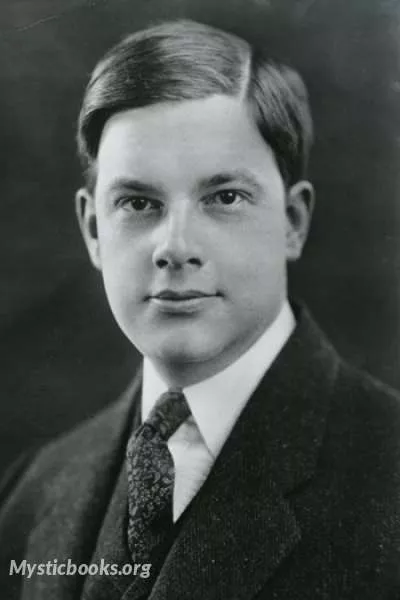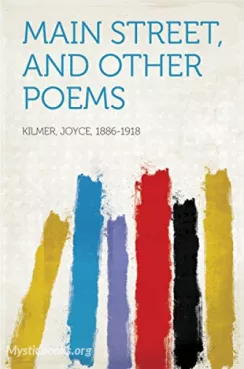
Timeline
Title
Country/Nationality
Joyce Kilmer
Alfred Joyce Kilmer was an American writer and poet mainly remembered for a short poem titled "Trees" (1913), which was published in the collection Trees and Other Poems in 1914. Though a prolific poet whose works celebrated the common beauty of the natural world as well as his Roman Catholic religious faith, Kilmer was also a journalist, literary critic, lecturer, and editor. At the time of his deployment to Europe during World War I, Kilmer was considered the leading American Roman Catholic poet and lecturer of his generation, whom critics often compared to British contemporaries G. K. Chesterton (1874–1936) and Hilaire Belloc (1870–1953). He enlisted in the New York National Guard and was deployed to France with the 69th Infantry Regiment (the famous "Fighting 69th") in 1917. He was killed by a sniper's bullet at the Second Battle of the Marne in 1918 at the age of 31. He was married to Aline Murray, also an accomplished poet and author, with whom he had five children.
While most of his works are largely unknown today, a select few of his poems remain popular and are published frequently in anthologies. Several critics—including both Kilmer's contemporaries and modern scholars—have dismissed Kilmer's work as being too simple and overly sentimental, and suggested that his style was far too traditional, even archaic. Many writers, including notably Ogden Nash, have parodied Kilmer's work and style—as attested by the many imitations of "Trees".
In April 1917, a few days after the United States entered World War I, Kilmer enlisted in the Seventh Regiment of the New York National Guard. In August, Kilmer was assigned as a statistician with the 165th Infantry Regiment (better known as the re-designated "Fighting 69th", U.S. 69th Infantry Regiment), of the 42nd "Rainbow" Division, and quickly rose to the rank of sergeant. Though he was eligible for commission as an officer and often recommended for such posts during the course of the war, Kilmer refused, stating that he would rather be a sergeant in the Fighting 69th than an officer in any other regiment.
During the course of the day, Kilmer led a scouting party to find the position of a German machine gun. When his comrades found him, sometime later, they thought at first that he was peering over the edge of a little hill, where he had crawled for a better view. When he did not answer their call, they ran to him and found him dead. According to Father Francis P. Duffy: “A bullet had pierced his brain. His body was carried in and buried by the side of Ames. God rest his dear and gallant soul.” A sniper's bullet likely killed him immediately. According to military records, Kilmer died on the battlefield near Muercy Farm, beside the Ourcq River near the village of Seringes-et-Nesles, in France, on July 30, 1918, at the age of 31. For his valor, Kilmer was posthumously awarded the Croix de Guerre (War Cross) by the French Republic.
Books by Joyce Kilmer

Trees and Other Poems
"I think that I shall never see, a poem as lovely as a tree; A tree whose hungry mouth is presd against the sweet earth's flowing breast ...".

Main Street, and Other Poems
Embark on a poetic journey through the heart of America, where the sights, sounds, and emotions of everyday life are transformed into verses of beauty and insight. In Joyce Kilmer's "Main Street, and Other Poems," you'll discover a world of vibrant i...

Snowman in the Yard
The Snowman in the Yard is Joyce Kilmer's most charming and memorable poem, one that captures the wonder of a child's imagination during the snowy season. Through its vivid imagery and melodic verse, the poem brings to life a magical snowman standing...

Alarm Clocks
Alarm Clocks by Joyce Kilmer is a collection of poems that explores the themes of war, religion, and patriotism. Kilmer, a devout Catholic and American patriot, wrote many of these poems while serving in the US Army during World War I. The poems in t...

Literature in the Making, by Some of its Makers
Published in 1917, "Literature in the Making" is a collection of essays by Joyce Kilmer, a poet and critic of the time. Kilmer's intention was to bridge the divide between those who create literature and those who analyze it. The book features interv...

Main Street
“Main Street” is a collection of poems by Joyce Kilmer, known for his celebration of the natural world and his Roman Catholic faith. Kilmer's poems are characterized by their lyrical style and traditional structure, often using vivid imagery to evok...

White Bird of Love
“White Bird of Love” is a collection of poems by Joyce Kilmer, a celebrated American poet known for his evocative descriptions of nature and his strong Roman Catholic faith. The collection showcases Kilmer's lyrical style, reflecting on themes of lov...

Summer of Love
Summer of Love by Joyce Kilmer is a collection of poems that showcases the author's flowing lyricism and dripping sentimentality. Published before his famous poem "Trees," this book reveals Kilmer's earlier work, characterized by its romantic themes...

Vision
This collection of poems by Joyce Kilmer, known for his iconic work 'Trees,' reflects the poet's profound connection to nature, faith, and the human experience. Spanning themes of beauty, spirituality, and the complexities of war, Kilmer's verses off...

Old Poets
“Old Poets” is a humorous poem by Joyce Kilmer, originally published in his 1914 collection *Trees and Other Poems*. It is dedicated to Robert Holliday, Kilmer's close friend and editor. The poem takes a lighthearted and satirical approach to examini...

Apartment House
The Apartment House is a collection of poems by Alfred Joyce Kilmer, a noted American poet, known for his poignant observations of urban life. These poems explore the complexities and contrasts of apartment dwelling, capturing the diverse characters...